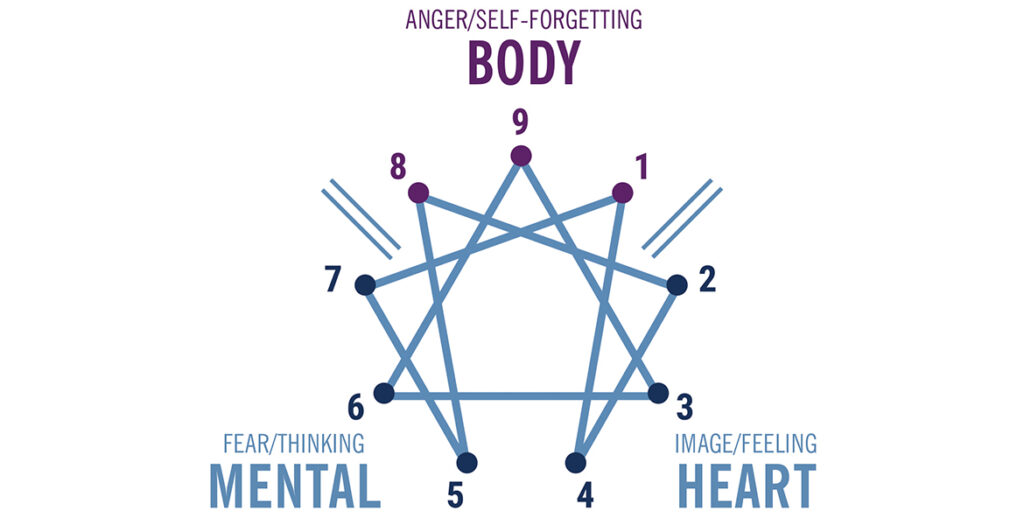
The Body Center Types (Types 8, 9, 1) are those who process information and interactions through their body and their gut instincts. When these types are actually in touch with their body—and their anger, they will know in each moment what they like and dislike, what energizes them, what drains them, and where they want to invest their time and energy. This knowing is useful in planning and time management.
Below are some strategies for our 8, 9 and 1 friends to consider when traversing time management:
8 – THE PROTECTOR/BOSS
- Manage your energy, not just the time. Adjust your energy to both what is appropriate and what is required. Eights may overschedule themselves due to the belief that they can personally handle large amounts of the work.
- Be aware of the amount of energy required for a task or project with a team. Be mindful that not everyone runs at your pace. Winging it doesn’t always work out so well.
- Schedule time to plan in advance—avoid unconsciously shooting from the hip. Know when a situation requires you to pause and think, assess and plan before moving into action.
- Don’t get derailed and distracted by obstacles along the way that make you angry. They are often unavoidable and a natural part of the process.
- Stay awake to rising anger and how you allow it to play out. Watch for signs of exhaustion and burnout—building in time for exercise, downtime, and relaxation is helpful when you need to release energy and renew.
- Include time to consider others’ points of view before moving into action. You’ll save time in the long run.
- High energy is always present when Eights are engaged in what truly interests them. Make sure to add these types of items throughout the weeks, months, and years on your calendar.
9 – THE MEDIATOR
- Plan your activities every day and stay committed to building in focus-time for your personal agenda. Do at least one thing a day for yourself.
- Establish regular check-in times with other teammates to gather energy and renew focus. An added benefit can be an enhanced sense of accomplishment.
- Break down tasks into smaller tasks. Ask yourself often, “What’s the next right action?”
- Deadlines are your friend. Use them that way.
- Making decisions and moving on can be energizing. Not wasting time running a movie over and over in your head about the possible decision/situation will be a relief and free up time for what’s most important.
- Learning when and how to say “no” will help you stay on track, neither sidetracked by others’ agendas nor drawn into inessential items and distractions. Remember, if it’s not a visceral YES, it’s probably a NO.
- Nines can become overwhelmed when overbooked with an impossible task list. Reviewing your priorities with friends and colleagues helps to regain a clear perspective. Build in time to do this on a regular basis.
- Accountability will help keep you on track. Make sure you remain accountable to yourself as well as to others.
- Give yourself the gift of real downtime and remember to acknowledge and celebrate your accomplishments.
1 – THE PERFECTIONIST
- Try to predetermine “good enough” for each project or situation. Ask for and be open to feedback from respected others when trying to sort out suitable end results. This will help you with allocating the proper time needed for projects while decreasing wasted worry and work.
- Ones may not accurately estimate how long it takes to do something. Pay attention to how long work actually takes, and if you find that you tend to short yourself on time, increase your estimates up front
- There are times when adopting a counterintuitive, flexible approach is both productive and fun. Enjoy—it can make your life, and everyone else’s, a little easier.
- Build in time to “chill”—take your attention off the details for a little while, let go of the thoughts, and then return to the task. Relax and include fun in your routine—even be spontaneous
- Watch out for getting over-reliant and narrowly focused on process, procedures, details—keep the goal or end result in front of you at all times.
- Notice when your critical internal dialog is a source of procrastination.
- Be mindful of the tendency to deem certain work as unimportant and put it to the side. Schedule time to take care of these items, so they don’t haunt you later on.
Let us know how this lands with you or if you have any additional strategies for the Body Types. Your input is important to us.
If you’d like more information on the Enneagram and the types, check out this link.




